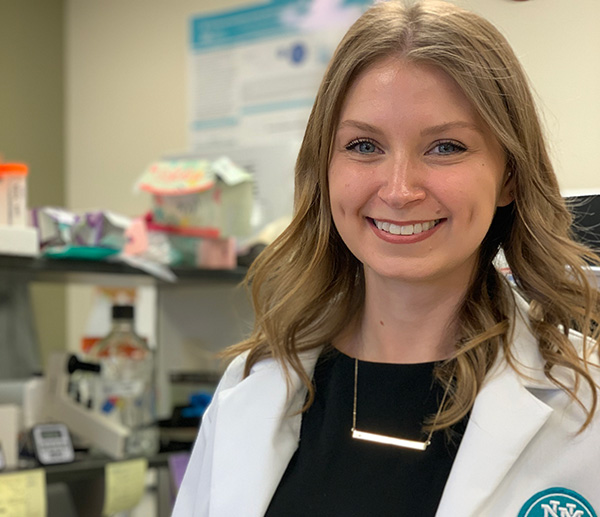Amanda “Mandy” Collar, PhD, remembers being shocked and angered by the 2022 U.S. Supreme Court’s Dobbs decision striking down a woman’s right to an abortion. But in typical fashion she decided to channel her outrage in an opinion piece that was published in the Annals of Internal Medicine.
Collar, an enrolled member of the Cherokee Nation, described how Native American women have faced obstacles to accessing abortion care, in large part because the Indian Health Service restricts the circumstances in which it can be provided.
“Indigenous people have long lacked control over their reproductive freedoms and their decision to be become a parent, or not,” she wrote. “When will Native American women, and all women, have true bodily autonomy?
Weighing in on matters of public concern is second nature for Collar, who is in her seventh year in The University of New Mexico School of Medicine’s MD/PhD program. She has published guest columns in the Albuquerque Journal and on the American College of Physicians website on topics ranging from access to feminine hygiene products to gun violence.
I have a super-strong interest in health policy and global public health. I see my research as a way to impact communities or populations.
She has also authored or co-authored 18 papers in peer-reviewed journals resulting from her doctoral research. She is listed as co-inventor on a provisional application for a patent for a Chlamydia trachomatis vaccine, and in 2022 she was one of four winners of the Herbert W. Nickens Medical Student Scholarship from the Association of American Medical Colleges.
“I have a super-strong interest in health policy and global public health,” Collar says. “I see my research as a way to impact communities or populations.”
“Mandy has had some fantastic leadership – I’ve really been impressed,” says Justin Baca, MD, PhD, an associate professor in the UNM Department of Emergency Medicine and co-director of the MD/PhD program. “She is somebody who is really poised to make a difference by bringing her lab research and scientific background closer to patients.”
The program weds the different skills of physicians and laboratory researchers, Baca says. “Every single MD/PhD student is doing something unique. They are committed to solving challenges that would be difficult to do from just an MD background or just a PhD background.”
Collar grew up in Alamogordo, N.M., and was the first member of her family to attend college, graduating from New Mexico State University with a BS in biology and a minor in government.
“I just always really liked school,” she says. “I actually didn’t like science at first, but in college I was in an introduction to biology class. The teacher made it interesting and fun. It’s amazing what one good teacher can do to change your life.”
She went on to a two-year post-baccalaureate research program at the National Institutes of Health, working under senior investigator Michail Lionakis, MD, Sc.D. “We were primarily looking at how a genetic receptor on monocytes predisposes humans to systemic candidiasis infections,” she says.
Collar shadowed Lionakis as he saw patients with rare infectious disease. “I remember one project I was on I would go see the patient with Dr. Lionakis in the afternoon, and then I would go to the lab and run tests on that blood,” she says. “I was like, ‘This is the coolest job ever.’ It just felt really meaningful. You felt like you were really helping them.”
Collar returned to New Mexico for UNM’s one-year Premedical Enrichment Program, studying the Ebola virus in the laboratory of Steven Bradfute, PhD, assistant professor in the Center for Global Health. Collar at first had thoughts of going into nursing, “but then I decided with my personality I needed to be in charge,” she says, laughing.
Medical school came next, with Collar at first enrolling in the four-year MD program. “With my background in research my initial thought was I didn’t need to do the PhD,” she said. “But during the first year of medical school I missed the wet lab. I realized I needed more formal training in research design, coming up with hypotheses, how to test them – how to become a PI, basically.”
She moved over to the MD/PhD program, whose participants spend two years in the MD track, then break out for several years of research to earn a PhD in Biomedical Sciences before returning for the final two years of medical school. Collar did her dissertation research with Kathryn Frietze, PhD, assistant professor in the Department of Molecular Genetics & Microbiology.
“My main project was identifying the natural antibody response to urogenital chlamydia infection,” she says. “We used that to engineer virus-like particle vaccines for chlamydia. I’m hopeful someone will be interested in it and advance it into clinical trials.”
Collar, who has been doing her third-year clinical rotations, expects to complete her MD training the spring of 2024 and is already looking ahead to residency – and after that a fellowship in infectious diseases.
As she looks to a future career as a physician scientist, “It’s really important to me that I work somewhere that shares my values of equity and justice,” she says. “I want to serve a diverse community and help the people who need it most. I don’t know what that’s going to look like.”

